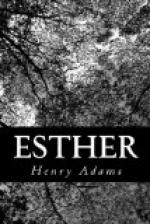“What kind of a revolver do you carry?” asked George, gravely, at his first interview with her; “do you like yours heavy, or say a 32 ball?”
“Don’t mind him, Catherine,” said Mrs. Murray; “he is always making poor jokes.”
“Oh, but I’m not strong enough to use heavy shooting-irons,” replied Catherine quite seriously. “I had a couple of light ones in my room at home, but father told me I could never hurt any thing with them, and I never did.”
“Always missed your man?” asked George.
“I never fired at a man but once. One night I took one of our herders for a thief and shot at him, but I missed, and just got laughed at for a week. That was before we moved down to Denver, where we don’t use pistols much.”
Strong felt a little doubt whether she was making fun of him or he of her, and she never left him in perfect security on this point.
“What is your name in Sioux, Catherine,” he would ask; “Laughing Strawberry, I suppose, or Jumping Turtle?”
“No!” she answered. “I have a very pretty name in Sioux. They call me the Sage Hen, because I am so quiet. I like it much better than my own name.”
Strong was beaten at this game. She capped all his questions for him with an air of such good faith as made him helpless. Whether it were real or assumed, he could not make up his mind. He took a great fancy to the Sage Hen, while she in her turn took a violent liking for Esther, as the extremest contrast to herself. When Esther realized that this product of Colorado was likely to be on her hands for several hours every day, she felt less amused than either Strong or Mr. Murray, for Miss Brooke’s conversation, though entertaining as far as it went, had not the charm of variety. It was not long before her visits to Esther’s studio became so frequent and so exhausting that Esther became desperate and felt that some relief must at any cost be found. The poor little prairie flower found New York at first exciting; she felt shy and awkward among the swarms of strange people to whose houses Mrs. Murray soon began to take her by way of breaking her in at once to the manners of New York society; and whenever she could escape, she fled to Esther and her quiet studio, with the feelings of a bird to its nest. The only drawback to her pleasure there was that she had nothing to do; her reading seemed to have been entirely in books of a severely moral caste, and in consequence she could not be induced to open so much as a magazine. She preferred to chatter about herself and the people she met. Before a week had passed Esther felt that something must be done to lighten this burden, and it was then that, as we shall see, Mr. Hazard suggested her using Catherine for a model. The idea might not have been so easily accepted under other circumstances, but it seemed for the moment a brilliant one.




